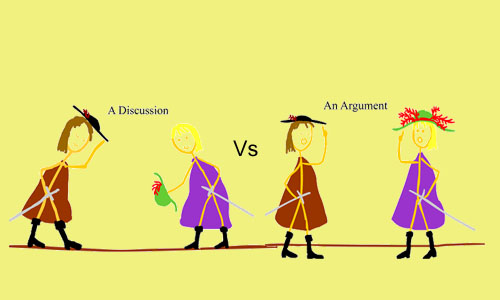Difference between Argument and Discussion
What is the difference between an argument and a discussion? Both are nouns that involve people talking with one another and telling what they think, feel or know to be true. The difference in these words lies in the usage and the connotation, or shade of meaning, behind each word.
An argument can mean a statement or series of statements for or against something. This is a more of a legal definition. It is used in a court of law to give proof and to persuade or in a formal debate. For example: The attorney faced the jury for his closing arguments. However, in most cases, the word ‘argument’ is used to mean something less formal. ‘Argument’ generally means an angry dispute or disagreement. Although by the definition it does not have to be a loud quarrel, in common usage it usually brings with it the idea of two or more people yelling or raising their voices to give their opinions. For example: The husband and wife had a loud argument over who should get to use the car. Other forms of ‘argument’ are the verb, ‘argue’, ‘argumentative’ and ‘arguably’.
‘Discussion’ has a much more positive feel to it. The definition is similar to ‘argument’ because it involves presenting ideas, information or opinions. However, the usage of the word ‘discussion’ between two or more people is not an angry or heated situation. It means talking in a conversational and reasonable manner with other people. For example: The husband and wife sat down and had a discussion about who was going to use the new car. ‘Discussion’ also does not have the same legal or technical usage in a court. A discussion is usually an informal and friendly situation where two or more people share and listen to the ideas or opinions of each other. For example: There was a discussion in the office about what to order for lunch.
When using a noun to give a clearer meaning to a type of conversation, whether ‘argument’ or ‘discussion’ is used depends on the situation. If the talk is of an angry tone with the parties being upset with each other or not willing to listen to each other’s view point, it is an argument. However, if the tone is more polite or rational and reasonable, it may be called a discussion. If the conversation is a formal or legal one, lines of reasoning or proof to state a case or side are called arguments. Knowing these differences between ‘argument’ and ‘discussion’ is important to give the correct meaning.
- Difference Between Hold on And Hang on - February 19, 2016
- Difference Between “Give it up” and “Applaud” - February 18, 2016
- Difference Between Condole And Console - February 17, 2016
Read More ESL Articles
Search DifferenceBetween.net :
2 Comments
Leave a Response
References :
[0]http://www.christianlogic.com/images/uploads/christianlogic_image_ddaf_discussion.png
[1]http://www.christianlogic.com/images/uploads/christianlogic_image_ddaf_argument.png


It’s very nice and let’s-clap-hands to simply tunnel through this with flatout legalism, but the truth is, “disagreement”, “discussion”, “debate”, etc. are all synonyms for FIGHTING. I say that as the most right-leaning person you will ever chance to meet, who is not clad in survivalist fatigues. We’ve taken language and split and split and split, until the primary colors of emotion, are all renamed and in 64 colors. Anything following “now, wait a minute”, may as well be someone in 1835 Tejas Province, drawing his sword cane. There are simply some who survive on a diet of pizza and debate, and these are aggressors who need be shut down as a matter of course (you notice I’m keeping the identity of “they”, generic).
All conflict, is aggression, and any past request to stop, is injury. And if you can’t accept that one, then you won’t like “need” and “want”, and my explanation of How They Are The Same Word. So, let’s not discuss it. You’re only going to fight about it, anyway.
Regardless of words being synonyms or not the tone in which you convey a conversation, proper context and enviornment all affect whether or not something is being discussed upon rather than the conversation is in the end an argument. I understand where your coming from though. The definition of difference is vague.